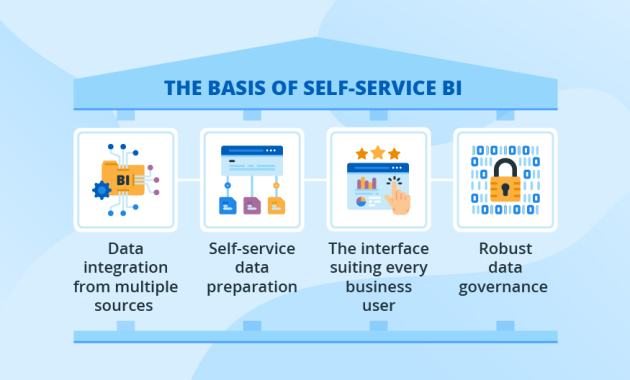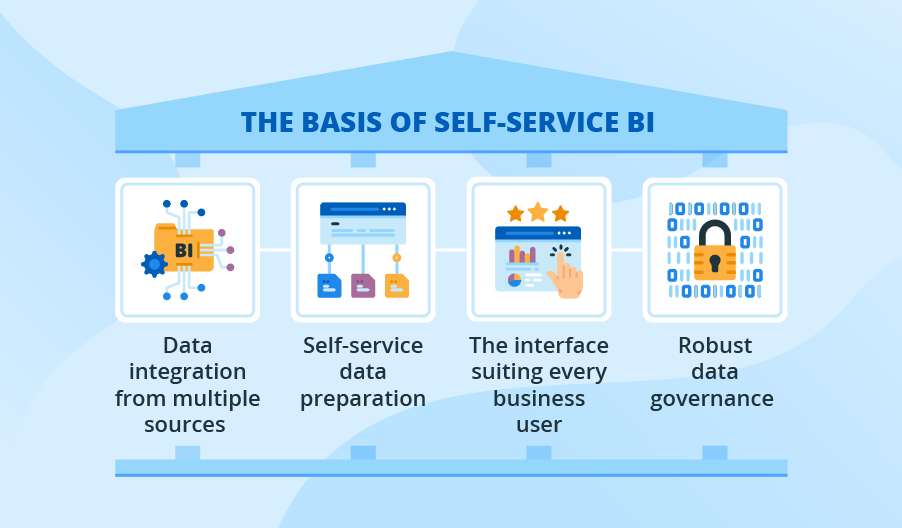
Self-Service Business Intelligence Software: Empowering Data-Driven Decisions
In today’s rapidly evolving business landscape, data has become the cornerstone of strategic decision-making. Organizations are increasingly seeking ways to harness the power of their data to gain a competitive edge. This is where self-service business intelligence (BI) software comes into play. It’s a revolutionary tool that empowers users across all departments to analyze data and extract actionable insights without relying heavily on IT or data science specialists. This article delves into the world of self-service business intelligence software, exploring its benefits, features, and how it can lead to smarter decisions.
The Rise of Data and the Need for Smart Solutions
The volume of data generated globally is exploding. Businesses are collecting vast amounts of information from various sources. These sources include customer interactions, sales transactions, marketing campaigns, and operational processes. This data, when analyzed effectively, can reveal hidden patterns, trends, and opportunities. However, the sheer volume of data presents a significant challenge. Traditional BI solutions often require specialized skills and lengthy implementation processes. This can create bottlenecks, delaying access to critical insights. Self-service business intelligence software addresses this challenge. It democratizes data analysis, making it accessible to a wider audience within an organization.
What is Self-Service Business Intelligence Software?
Self-service BI software is a type of business intelligence tool. It empowers business users to explore data, create reports, and build dashboards independently. It does so without requiring extensive technical expertise. These tools typically feature user-friendly interfaces, drag-and-drop functionality, and pre-built templates. This makes it easy for users to connect to data sources, visualize data, and share their findings. The goal is to put data analysis directly into the hands of those who need it most. This fosters a data-driven culture and accelerates the decision-making process.
Key Features of Self-Service BI Software
Self-service business intelligence software boasts a range of features designed to facilitate data exploration and analysis. These features include:
- Data Connectivity: The ability to connect to various data sources, including databases, spreadsheets, cloud platforms, and more.
- Data Preparation: Tools for cleaning, transforming, and preparing data for analysis.
- Data Visualization: A wide array of charts, graphs, and maps to represent data visually.
- Reporting and Dashboards: Capabilities to create custom reports and interactive dashboards.
- Data Discovery: Features that enable users to explore data and uncover hidden patterns.
- Collaboration and Sharing: Tools for sharing insights and collaborating with colleagues.
- Mobile Access: The ability to access reports and dashboards on mobile devices.
- Advanced Analytics: Some platforms offer advanced features like predictive analytics and machine learning.
Benefits of Implementing Self-Service BI Software
Implementing self-service business intelligence software offers numerous advantages for organizations. These benefits include:
- Faster Decision-Making: Users can quickly access and analyze data, enabling them to make informed decisions in a timely manner.
- Improved Data Literacy: Self-service BI empowers users to understand and interpret data. This promotes a data-driven culture.
- Increased Productivity: Business users can independently generate reports and dashboards, reducing the reliance on IT and data science teams.
- Reduced Costs: By enabling users to perform their own analysis, organizations can reduce the need for expensive external consultants.
- Enhanced Collaboration: Self-service BI tools facilitate collaboration and knowledge sharing across departments.
- Better Business Insights: By empowering users to explore data, organizations can uncover valuable insights that lead to improved business outcomes.
Choosing the Right Self-Service BI Software
Selecting the right self-service BI software for your organization is crucial for success. Consider these factors when evaluating different options:
- Ease of Use: The software should have a user-friendly interface and intuitive features.
- Data Connectivity: Ensure the software can connect to your existing data sources.
- Data Visualization Capabilities: The software should offer a wide range of visualization options.
- Reporting and Dashboarding Features: The software should allow you to create custom reports and interactive dashboards.
- Scalability: The software should be able to handle growing data volumes and user demands.
- Security: The software should have robust security features to protect your data.
- Pricing and Support: Consider the software’s pricing model and the level of support provided by the vendor.
Real-World Applications of Self-Service BI
Self-service business intelligence software is used across various industries and departments. Here are some examples:
- Sales: Sales teams can track sales performance, identify top-performing products, and forecast future sales.
- Marketing: Marketers can analyze campaign performance, understand customer behavior, and optimize marketing spend.
- Finance: Finance teams can monitor financial performance, track expenses, and identify cost-saving opportunities.
- Operations: Operations teams can analyze operational efficiency, identify bottlenecks, and improve process optimization.
- Human Resources: HR can analyze employee data, track employee performance, and improve employee retention.
The Future of Self-Service BI
The future of self-service business intelligence software is bright. Several trends are shaping the evolution of this technology:
- Artificial Intelligence (AI) and Machine Learning (ML): AI and ML are being integrated into BI platforms to automate tasks, provide insights, and improve data analysis.
- Cloud-Based BI: Cloud-based BI solutions are becoming increasingly popular due to their scalability, flexibility, and cost-effectiveness.
- Data Governance: Data governance is becoming more important as organizations grapple with data privacy and compliance regulations.
- Embedded Analytics: Embedding analytics into business applications is becoming increasingly common. This allows users to access insights directly within their workflows.
- Augmented Analytics: Augmented analytics uses AI and ML to automate data preparation, insight generation, and data storytelling.
Leading Smarter Decisions: The Power of Self-Service BI
Self-service business intelligence software is revolutionizing how organizations approach data analysis. By empowering business users to access and analyze data independently, these tools are driving faster decision-making, improving data literacy, and fostering a data-driven culture. As the volume of data continues to grow, the demand for self-service BI will only increase. Organizations that embrace this technology will be well-positioned to gain a competitive advantage and lead smarter decisions. The transition to self-service business intelligence marks a significant shift in how businesses operate, opening doors to new levels of efficiency and strategic insight. The investment in self-service business intelligence software is an investment in a data-driven future.
By adopting self-service business intelligence software, companies can unlock hidden potential within their data. They can optimize operations, improve customer experiences, and achieve greater profitability. The ability to quickly access and interpret data empowers employees to make better decisions.
Self-service business intelligence software is no longer a luxury. It is a necessity for businesses that want to thrive in the modern data-driven world. By providing easy-to-use tools, businesses can empower their employees. This helps them analyze data and make more informed decisions. This leads to improved business outcomes and a stronger competitive advantage. The impact of self-service BI extends beyond the IT department. It reshapes the entire organizational structure. It makes data accessible to everyone, regardless of their technical expertise.
The implementation of self-service business intelligence software is a strategic imperative. It’s essential for organizations that aim to remain competitive. It allows them to respond quickly to market changes and customer needs. The ability to quickly analyze data also allows for quicker innovation. This further enhances the value of self-service BI.
The benefits of self-service BI extend to various departments. It allows them to make data-driven decisions. This includes sales, marketing, finance, and operations. Each department can leverage the software to improve its performance. They can optimize processes and gain a deeper understanding of their respective areas. This holistic approach contributes to overall business success. Self-service business intelligence software ensures that all employees have access to critical data. It enables data-driven decision-making at all levels of the organization.
In conclusion, self-service business intelligence software is a powerful tool. It enables organizations to lead smarter decisions. It empowers users, improves data literacy, and drives better business outcomes. As the business landscape evolves, adopting self-service BI is a strategic move. It paves the way for a data-driven future.
[See also: Choosing the Best BI Tool for Your Needs]
[See also: Data Visualization Best Practices]
[See also: The Role of AI in Modern BI]

